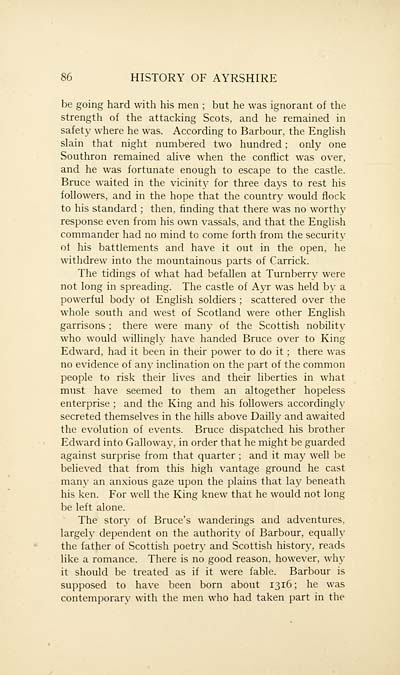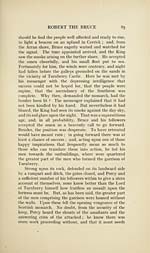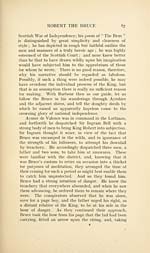Download files
Complete book:
Individual page:
Thumbnail gallery: Grid view | List view

86 HISTORY OF AYRSHIRE
be going hard with his men ; but he was ignorant of the
strength of the attacking Scots, and he remained in
safety where he was. According to Barbour, the English
slain that night numbered two hundred ; only one
Southron remained alive when the conflict was over,
and he was fortunate enough to escape to the castle.
Bruce waited in the vicinit}-- for three days to rest his
followers, and in the hope that the country would flock
to his standard ; then, finding that there was no worthy
response even from his own vassals, and that the English
commander had no mind to come forth from the security
of his battlements and have it out in the open, he
withdrew into the mountainous parts of Carrick.
The tidings of what had befallen at Turnberry were
not long in spreading. The castle of Ayr was held by a
powerful body of English soldiers ; scattered over the
whole south and west of Scotland were other English
garrisons ; there were many of the Scottish nobility
who would willingly have handed Bruce over to King
Edward, had it been in their power to do it ; there was
no evidence of any inclination on the part of the common
people to risk their lives and their liberties in what
must have seemed to them an altogether hopeless
enterprise ; and the King and his followers accordingly
secreted themselves in the hills above Dailly and awaited
the evolution of events. Bruce dispatched his brother
Edward into Galloway, in order that he might be guarded
against surprise from that quarter ; and it may well be
believed that from this high vantage ground he cast
man} r an anxious gaze upon the plains that lay beneath
his ken. For well the King knew that he would not long
be left alone.
The story of Bruce's wanderings and adventures,
largely dependent on the authority of Barbour, equally
the father of Scottish poetry and Scottish history, reads
like a romance. There is no good reason, however, why
it should be treated as if it were fable. Barbour is
supposed to have been born about 1316 ; he was
contemporary with the men who had taken part in the
be going hard with his men ; but he was ignorant of the
strength of the attacking Scots, and he remained in
safety where he was. According to Barbour, the English
slain that night numbered two hundred ; only one
Southron remained alive when the conflict was over,
and he was fortunate enough to escape to the castle.
Bruce waited in the vicinit}-- for three days to rest his
followers, and in the hope that the country would flock
to his standard ; then, finding that there was no worthy
response even from his own vassals, and that the English
commander had no mind to come forth from the security
of his battlements and have it out in the open, he
withdrew into the mountainous parts of Carrick.
The tidings of what had befallen at Turnberry were
not long in spreading. The castle of Ayr was held by a
powerful body of English soldiers ; scattered over the
whole south and west of Scotland were other English
garrisons ; there were many of the Scottish nobility
who would willingly have handed Bruce over to King
Edward, had it been in their power to do it ; there was
no evidence of any inclination on the part of the common
people to risk their lives and their liberties in what
must have seemed to them an altogether hopeless
enterprise ; and the King and his followers accordingly
secreted themselves in the hills above Dailly and awaited
the evolution of events. Bruce dispatched his brother
Edward into Galloway, in order that he might be guarded
against surprise from that quarter ; and it may well be
believed that from this high vantage ground he cast
man} r an anxious gaze upon the plains that lay beneath
his ken. For well the King knew that he would not long
be left alone.
The story of Bruce's wanderings and adventures,
largely dependent on the authority of Barbour, equally
the father of Scottish poetry and Scottish history, reads
like a romance. There is no good reason, however, why
it should be treated as if it were fable. Barbour is
supposed to have been born about 1316 ; he was
contemporary with the men who had taken part in the
Set display mode to:
![]() Universal Viewer |
Universal Viewer | ![]() Mirador |
Large image | Transcription
Mirador |
Large image | Transcription
Images and transcriptions on this page, including medium image downloads, may be used under the Creative Commons Attribution 4.0 International Licence unless otherwise stated. ![]()
| Histories of Scottish families > Ayrshire > Volume 1 > (96) Page 86 |
|---|
| Permanent URL | https://digital.nls.uk/95195438 |
|---|
| Attribution and copyright: |
|
|---|
| Description | A selection of almost 400 printed items relating to the history of Scottish families, mostly dating from the 19th and early 20th centuries. Includes memoirs, genealogies and clan histories, with a few produced by emigrant families. The earliest family history goes back to AD 916. |
|---|

